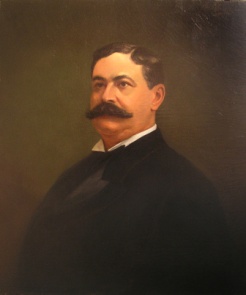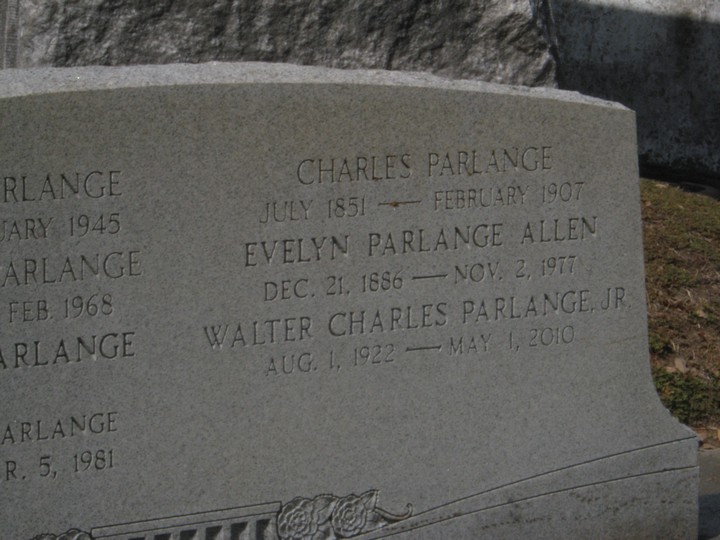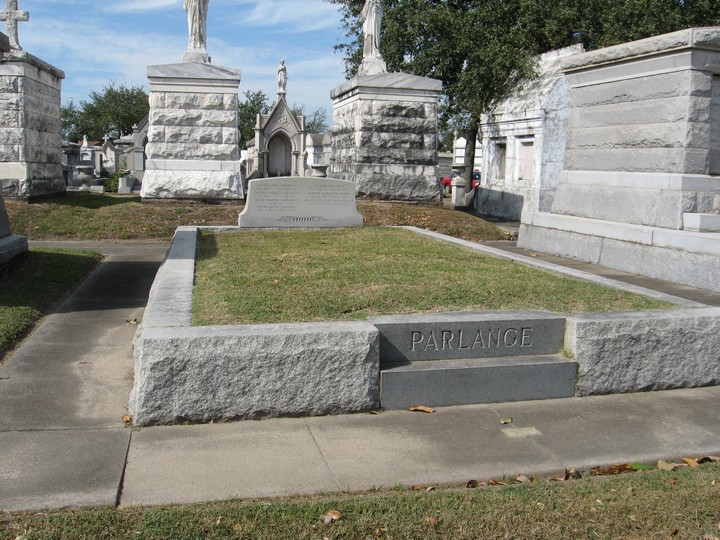Parlange was born in New Orleans, Louisiana to Charles and Virginie (Trahan) Parlange of Pointe Coupee, Louisiana. He attended Centenary College in Jackson, Louisiana. He read law in 1873 and resided at his family home at the Parlange Plantation House near New Roads, Louisiana.
Judge Parlange sometimes cited the decisions of the British Lord Admirals in his own admiralty and maritime cases. According to the New York Post, Judge Parlange presided over a case of international significance in 1901. It was a suit brought by three officials of the South African Boer state, then at war with Great Britain, "asking for an injunction to prevent the shipment of mules and horses from New Orleans to the British Army in South Africa." Although Judge Parlange denied the injunction and dismissed the suit for lack of jurisdiction, he also addressed the merits by stating that "mules and horses cannot be regarded as munitions of war; . . . under the treaty of Washington of 1871 with Great Britain, private citizens of neutral countries can lawfully sell supplies to belligerents; . . . the vessels which the plaintiffs sought to enjoin and prevent from carrying mules and horses to Africa were private vessels not equipped for the military service of England, but carrying on their regular commercial business, . . ."
Parlange was engaged in the private practice of law in Pointe Coupee Parish, Louisiana from 1873 to 1880. He was named United States Commissioner from Louisiana to the Paris Exposition of 1878 and was a member of the Louisiana Constitutional Convention of 1879. Parlange was elected to the Louisiana state senate from 1880 to 1885 representing Pointe Coupee Parish and Avoyelles Parish. He resigned his senate seat to be the United States Attorney for the Eastern District of Louisiana from 1885 to 1889. He was the chief author of the federal Anti-Lottery Postal Bill, signed into law on September 19, 1890, by President Benjamin Harrison. He was in private practice of law in New Orleans, Louisiana from 1889 to 1892. Elected Lieutenant Governor of Louisiana in 1892, he resigned in 1893 to serve as an Associate justice, Supreme Court of Louisiana until 1894.
Parlange was nominated by President Grover Cleveland to be a federal judge in the United States District Court for the Eastern District of Louisiana on December 11, 1893. This nomination was to a seat vacated by Edward C. Billings. Parlange was confirmed by the United States Senate on January 15, 1894, and received his commission the same day. Parlange served as a federal judge until his death on February 4, 1907.
Judge Parlange was married to Louise Denis Parlange and had three children. According to the February 6, 1907, New York Times, he "died suddenly . . . of apoplexy" in New Orleans on February 4, 1907.
Parlange was born in New Orleans, Louisiana to Charles and Virginie (Trahan) Parlange of Pointe Coupee, Louisiana. He attended Centenary College in Jackson, Louisiana. He read law in 1873 and resided at his family home at the Parlange Plantation House near New Roads, Louisiana.
Judge Parlange sometimes cited the decisions of the British Lord Admirals in his own admiralty and maritime cases. According to the New York Post, Judge Parlange presided over a case of international significance in 1901. It was a suit brought by three officials of the South African Boer state, then at war with Great Britain, "asking for an injunction to prevent the shipment of mules and horses from New Orleans to the British Army in South Africa." Although Judge Parlange denied the injunction and dismissed the suit for lack of jurisdiction, he also addressed the merits by stating that "mules and horses cannot be regarded as munitions of war; . . . under the treaty of Washington of 1871 with Great Britain, private citizens of neutral countries can lawfully sell supplies to belligerents; . . . the vessels which the plaintiffs sought to enjoin and prevent from carrying mules and horses to Africa were private vessels not equipped for the military service of England, but carrying on their regular commercial business, . . ."
Parlange was engaged in the private practice of law in Pointe Coupee Parish, Louisiana from 1873 to 1880. He was named United States Commissioner from Louisiana to the Paris Exposition of 1878 and was a member of the Louisiana Constitutional Convention of 1879. Parlange was elected to the Louisiana state senate from 1880 to 1885 representing Pointe Coupee Parish and Avoyelles Parish. He resigned his senate seat to be the United States Attorney for the Eastern District of Louisiana from 1885 to 1889. He was the chief author of the federal Anti-Lottery Postal Bill, signed into law on September 19, 1890, by President Benjamin Harrison. He was in private practice of law in New Orleans, Louisiana from 1889 to 1892. Elected Lieutenant Governor of Louisiana in 1892, he resigned in 1893 to serve as an Associate justice, Supreme Court of Louisiana until 1894.
Parlange was nominated by President Grover Cleveland to be a federal judge in the United States District Court for the Eastern District of Louisiana on December 11, 1893. This nomination was to a seat vacated by Edward C. Billings. Parlange was confirmed by the United States Senate on January 15, 1894, and received his commission the same day. Parlange served as a federal judge until his death on February 4, 1907.
Judge Parlange was married to Louise Denis Parlange and had three children. According to the February 6, 1907, New York Times, he "died suddenly . . . of apoplexy" in New Orleans on February 4, 1907.
Family Members
Sponsored by Ancestry
Advertisement
Explore more
Sponsored by Ancestry
Advertisement









